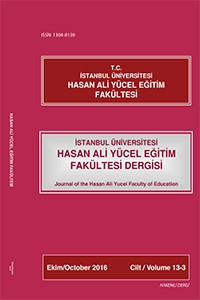ÖĞRENEN ÖZERKLİĞİ, İNGİLİZCE ÖĞRETİMİNE YANSIMALARI VE HAYEF ÖRNEĞİNDE ÖĞRETMEN ADAYLARININ DEĞİŞEN ÖĞRETMEN ROLLERİ ALGISI
Öz
Öğrenen özerkliği, dışarıdan bilgi yığmaya dayanan
geleneksel eğitim anlayışına karşıt olarak, bireyin kendi öğrenmesinin
sorumluluğunu aldığı, öz kaynaklarını kullandığı, öğrenme stratejisi odaklı,
sorgulayıcı öğrenme biçimini öne çıkarmaktadır. Bu çalışmanın amacı, günümüz
eğitim anlayışını şekillendiren özerklik kavramını yabancı dil öğretimine
yansımaları ile ortaya koymak ve özerkliğe koşut olarak değişen öğretmen
rollerinin bu rollerin uygulayıcısı olacak öğretmen adayları tarafından hangi
öncelik sırasında algılandığını araştırmaktır. Bu doğrultuda, önce özerkliğin
dil sınıfı için yansımalarını dünya ve Türkiye’deki sınıf içi uygulama
alalanlarıyla ortaya koyan araştırma, aynı zamanda İstanbul Üniversitesi Hasan
Ali Yücel Eğitim Fakültesi’ndeki İngilizce öğretmen adaylarının (N=57) değişen
öğretmen rolleri algısı üzerine önem sıralama ölçeği kullanılarak yapılan yarı
niceliksel bir çalışmanın sonuçlarını da içermekte ve özerklik sonrası öğretmen
rollerinin her kademeden aday öğretmenler tarafından ne denli benimsendiği
sorusuna yanıt bulmaya çalışmaktadır. Sonuçlar göstermektedir ki özerklikle
özdeşleşen ve etkileşimi, öz yönelimliliği ve bireyselleşmiş öğretimi önceleyen
roller öğretmen adayları tarafından çoğunlukla benimsenirken, geleneksel
sınıfla özdeşleşen öğretmen rollerinden güdülemeye halen kaydadeğer bir önem
atfedilmektedir.
Anahtar Kelimeler
Kaynakça
- Amidon, E. & Hunter, E. (1967). Improving teaching. Holt: Rinehart& Winston.
- Benson, P. & Voller, P. (1997). Autonomy and independence in language learning. London and New York: Longman.
- Benson, P. (2005). Autonomy and information technology in the educational discourse of the information. Information technology and innovation in language education, 1, 173.
- Benson, P. (2007). Autonomy in language teaching and learning. Language teaching, 40(1), 21-40.
- Council of Europe (1998). Learner autonomy in modern languages. Strasburg: Editions of Council of Europe.
- Dickinson, L. (1987). Self-instruction in language learning. Cambridge: Cambridge University Press.
- Field, J. (2007). Looking outwards, not inwards. ELT journal, 61(1), 30-38.
- Freire, P. (2003). Ezilenlerin pedagojisi (Çev. Dilek Hattatoğlu ve E. Özbek). İstanbul: Ayrıntı Yayınları.
- Green, S. K. & Gredler, M. E. (2002). A review and analysis of constructivism for school-based practice. School Psychology Review, 31(1), 53.
- Holec, H. (1981). Autonomy in foreign language learning, Oxford: Pergamon.
Learner Autonomy, Implications for ELT and Prospective Teachers’ Perception of Changing Teacher Roles in The Context of HAYEF
Öz
Contrary to the traditional understanding
of education that heavily relies on the accumulation of knowledge, learner
autonomy brings under focus a new type of learning that prioritizes strategy
focused, critical instruction where the individual takes on the responsibilty
of his/her own learning and utilizes his/her own resources to this end. The aim
of this study is to portray the concept of learner autonomy with its
implications for foreign language teaching and to investigate the extent of
importance attributed to the teacher roles that have been reshaped in the
post-autonomy as percieved by the teacher candidates. To this end, the research
initially highlights the implications of learner autonomy on the language class
with particular references to global and Turkish contexts of ELT, also
featuring the results of a quasi-quantitative survey based on importance
listing scale which was conducted with the English teacher candidates at
Istanbul University Hasan Ali Yucel Faculty of Education (N=57), seeking
response to the question of “to what extent are the autonomy related teacher
roles adopted by the teacher candidates?”. The results indicate that while
autonomy associated teacher roles that prioritize strategy-based, self-directed
learning and interaction are on the most part adopted by the prospective
teachers, “motivating”, regarded among the traditional teacher roles, is still
recognized as notably important.
Anahtar Kelimeler
English language teaching learner autonomy self directedness perception of teacher roles
Kaynakça
- Amidon, E. & Hunter, E. (1967). Improving teaching. Holt: Rinehart& Winston.
- Benson, P. & Voller, P. (1997). Autonomy and independence in language learning. London and New York: Longman.
- Benson, P. (2005). Autonomy and information technology in the educational discourse of the information. Information technology and innovation in language education, 1, 173.
- Benson, P. (2007). Autonomy in language teaching and learning. Language teaching, 40(1), 21-40.
- Council of Europe (1998). Learner autonomy in modern languages. Strasburg: Editions of Council of Europe.
- Dickinson, L. (1987). Self-instruction in language learning. Cambridge: Cambridge University Press.
- Field, J. (2007). Looking outwards, not inwards. ELT journal, 61(1), 30-38.
- Freire, P. (2003). Ezilenlerin pedagojisi (Çev. Dilek Hattatoğlu ve E. Özbek). İstanbul: Ayrıntı Yayınları.
- Green, S. K. & Gredler, M. E. (2002). A review and analysis of constructivism for school-based practice. School Psychology Review, 31(1), 53.
- Holec, H. (1981). Autonomy in foreign language learning, Oxford: Pergamon.
Ayrıntılar
| Bölüm | Makaleler |
|---|---|
| Yazarlar | |
| Yayımlanma Tarihi | 29 Aralık 2016 |
| Yayımlandığı Sayı | Yıl 2016 Cilt: 13 Sayı: 3 |


